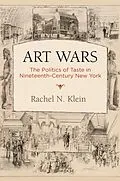A study of three controversies that illuminate the changing cultural role of art exhibition in the nineteenth centuryFrom the antebellum era through the Gilded Age, New York City's leading art institutions were lightning rods for conflict. In the decades before the Civil War, art promoters believed that aesthetic taste could foster national unity and assuage urban conflicts, by the 1880s such hopes had faded, and the taste for art assumed more personal connotations associated with consumption and domestic decoration. Art Wars chronicles three protracted public battles that marked this transformation. The first battle began in 1849 and resulted in the downfall of the American Art-Union, the most popular and influential art institution in North America at mid-century. The second erupted in 1880 over the Metropolitan Museum's massive collection of Cypriot antiquities, which had been plundered and sold to its trustees by the man who became the museum's first paid director. The third escalated in the mid-1880s and forced the Metropolitan Museum to open its doors on Sundaythe only day when working people were able to attend.In chronicling these disputes, Rachel N. Klein considers cultural fissures that ran much deeper than the specific complaints that landed protagonists in court. New York's major nineteenth-century art institutions came under intense scrutiny not only because Americans invested them with moral and civic consequences but also because they were part and parcel of explosive processes associated with the rise of industrial capitalism. Elite New Yorkers spearheaded the creation of the Art-Union and the Metropolitan, but those institutions became enmeshed in popular struggles related to slavery, immigration, race, industrial production, and the rights of working people. Art Wars examines popular engagement with New York's art institutions and illuminates the changing cultural role of art exhibition over the course of the nineteenth century.
Autorentext
Rachel N. Klein is Professor of History at the University of California, San Diego, and author of Unification of a Slave State: The Rise of the Planter Class in the South Carolina Backcountry.
Inhalt
Autorentext
Rachel N. Klein is Professor of History at the University of California, San Diego, and author of Unification of a Slave State: The Rise of the Planter Class in the South Carolina Backcountry.
Inhalt
Introduction. The Importance of Taste: Intellectual Roots 1
Chapter 1. Paintings in Public Life: The Rise of the American Art-Union
Chapter 2. The Limits of Cultural Stewardship: The Fall of the American Art-Union
Chapter 3. Art and Industry: Debates of the 1850s
Chapter 4. The Art of Decoration and the Transformation of Stewardship: The Making of the Metropolitan Museum of Art
Chapter 5. Metropolitan Museum on Trial: Antiquities, Expertise and the Problem of Race
Chapter 6. The Battle for Sundays at the Museum
Epilogue. Edith Wharton's Museum
Notes
Index
Acknowledgments
Titel
Art Wars
Untertitel
The Politics of Taste in Nineteenth-Century New York
Autor
EAN
9780812296884
Format
E-Book (pdf)
Hersteller
Genre
Veröffentlichung
19.06.2020
Digitaler Kopierschutz
Adobe-DRM
Anzahl Seiten
312
Laden...
Unerwartete Verzögerung
Ups, ein Fehler ist aufgetreten. Bitte versuchen Sie es später noch einmal.
